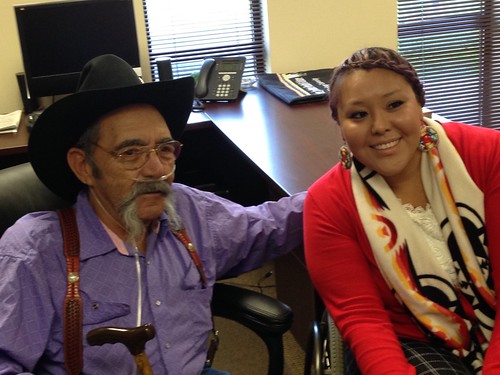
Shawna Kalama is a proud member of the Confederated Tribes of Warm Springs and the Confederated Tribes and Bands of the Yakama Nation. She’s also a beginning rancher, pursuing her dream the past few years near the Cascade Mountains on the Yakama Indian Reservation in Washington State. Kalama has successfully leveraged several USDA programs to simultaneously support both her entrepreneurial education goals and her growing livestock operation.
She began earning her business degree at Heritage University, and recently participated in a risk management education program, sponsored by the USDA’s Risk Management Agency (RMA). This week, the agency announced that $8.7 million in cooperative agreement funding is available for the risk management education program for fiscal year 2016. The program introduces the agency’s risk management tools, crop and livestock insurance programs and educational partnerships to new and beginning, and traditionally underserved farmers and ranchers. The curriculum includes an overview of RMA’s Strengths, Weaknesses, Opportunities and Threats (SWOT) analysis tool, which identifies potential problems, and finds solutions and resources to help beginning farmers and ranchers manage risks. Nearly 90,000 producers participated in risk management education events in 2015.
The funding would give organizations needed resources to develop training and education tools to help farmers and ranchers, especially those traditionally underserved or with limited resources, learn how to effectively managing long-term risks and challenges.
Inspired by what she learned, Kalama met with a seasoned tribal rancher: James McCuen, who works for the Bureau of Indian Affairs and is Chairman of the Pacific Northwest Intertribal Agriculture Council (IAC). He and Kalama discussed a variety of helpful beginning rancher topics. The two acknowledged the importance of supporting their tribes’ past and future generations, and their commitment to ensuring that Native American agriculture continues to be known for respect of culture, self and sacred lands.
To help realize her business goals, Kalama secured a microloan from USDA’s Farm Service Agency along with helpful support from the IAC. What began as a cow/calf operation has grown today to include 30 cows (red and black Angus), 10 calves, and two registered Angus bulls.
With the help of her education and training, her mentor, and USDA’s resources and programs, Kalama bolstered her cattle operation within three years. Given the strong, positive consumer demand, Kalama ensures that her cows are calving year round to provide quality beef every month.
As the director of the Spokane Region, I am proud to have witnessed the value of the risk management education and training, as well as other USDA resources, which have provided a steady path for her business growth. This includes RMA programs and USDA's new farmers website, which has in depth information for new farmers and ranchers such as how to increase access to land and capital; build new market opportunities; participate in conservation opportunities; select and use the right risk management tools; and access USDA education, and technical support programs.
Making sure that producers like Kalama have access to the right tools and guidance is central to RMA’s mission. We’re committed to helping producers build strong farming and ranching communities, while helping them to manage their risks as they grow their business. It’s the most important thing we do every day.
